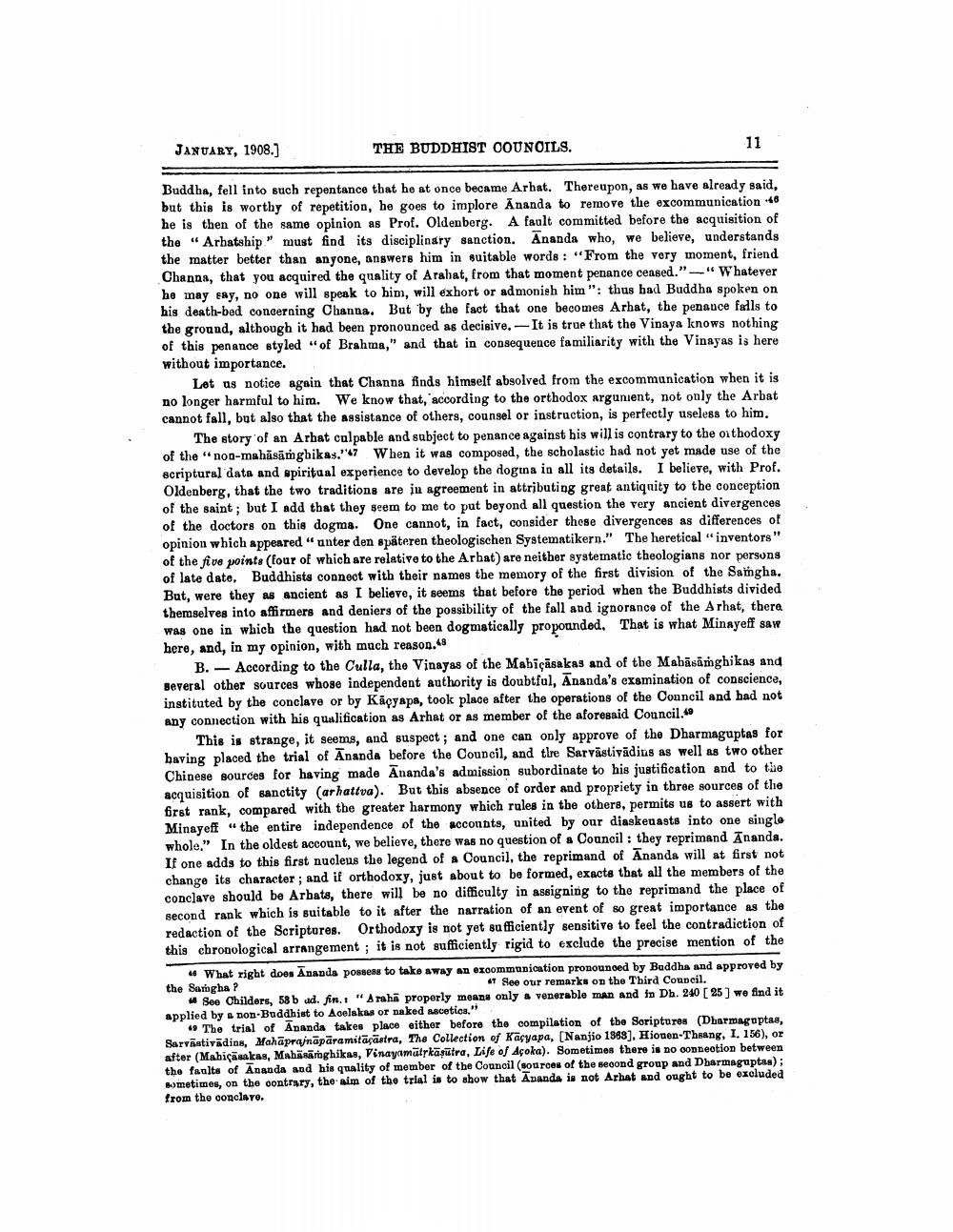________________
11
JANUARY, 1908.]
THE BUDDHIST COUNCILS.
Buddha, fell into such repentance that he at once became Arhat. Thereupon, as we have already said, but this is worthy of repetition, he goes to implore Ananda to remove the excommunication 46 he is then of the same opinion as Prof. Oldenberg. A fault committed before the acquisition of the "Arhatship" must find its disciplinary sanction. Ananda who, we believe, understands the matter better than anyone, answers him in suitable words: "From the very moment, friend Channa, that you acquired the quality of Arahat, from that moment penance ceased.""Whatever he may say, no one will speak to him, will exhort or admonish him": thus had Buddha spoken on his death-bed concerning Channa. But by the fact that one becomes Arhat, the penauce falls to the ground, although it had been pronounced as decisive. It is true that the Vinaya knows nothing of this penance styled "of Brahma," and that in consequence familiarity with the Vinayas is here without importance.
Let us notice again that Channa finds himself absolved from the excommunication when it is no longer harmful to him. We know that, according to the orthodox argument, not only the Arbat cannot fall, but also that the assistance of others, counsel or instruction, is perfectly useless to him.
The story of an Arhat culpable and subject to penance against his will is contrary to the orthodoxy of the "non-mahāsāmghikas."7 When it was composed, the scholastic had not yet made use of the scriptural data and spiritual experience to develop the dogma in all its details. I believe, with Prof. Oldenberg, that the two traditions are in agreement in attributing great antiquity to the conception of the saint; but I add that they seem to me to put beyond all question the very ancient divergences of the doctors on this dogma. One cannot, in fact, consider these divergences as differences of opinion which appeared " unter den späteren theologischen Systematikern." The heretical "inventors" of the five points (four of which are relative to the Arhat) are neither systematic theologians nor persons of late date, Buddhists connect with their names the memory of the first division of the Samgha. But, were they as ancient as I believe, it seems that before the period when the Buddhists divided themselves into affirmers and deniers of the possibility of the fall and ignorance of the Arhat, there was one in which the question had not been dogmatically propounded. That is what Minayeff saw here, and, in my opinion, with much reason.48
B. According to the Culla, the Vinayas of the Mabiçasakas and of the Mahasamghikas and several other sources whose independent authority is doubtful, Ananda's examination of conscience, instituted by the conclave or by Kaçyapa, took place after the operations of the Council and had not any connection with his qualification as Arhat or as member of the aforesaid Council.49
This is strange, it seems, and suspect; and one can only approve of the Dharmaguptas for having placed the trial of Ananda before the Council, and the Sarvästivadius as well as two other Chinese sources for having made Ananda's admission subordinate to his justification and to the acquisition of sanctity (arhattva). But this absence of order and propriety in three sources of the first rank, compared with the greater harmony which rules in the others, permits us to assert with Minayeff "the entire independence of the accounts, united by our diaskeuasts into one single whole." In the oldest account, we believe, there was no question of a Council: they reprimand Ananda. If one adds to this first nucleus the legend of a Council, the reprimand of Ananda will at first not change its character; and if orthodoxy, just about to be formed, exacts that all the members of the conclave should be Arhats, there will be no difficulty in assigning to the reprimand the place of second rank which is suitable to it after the narration of an event of so great importance as the redaction of the Scriptures. Orthodoxy is not yet sufficiently sensitive to feel the contradiction of this chronological arrangement; it is not sufficiently rigid to exclude the precise mention of the
46 What right does Ananda possess to take away an excommunication pronounced by Buddha and approved by 47 See our remarks on the Third Council. the Samgha?
See Childers, 58b ad. fin.: "Araha properly means only a venerable man and in Dh. 240 [25] we find it applied by a non-Buddhist to Acelakas or naked ascetica."
49 The trial of Ananda takes place either before the compilation of the Scriptures (Dharmaguptas, Sarvästivadins, Mahaprajnāpāramitaçãstra, The Collection of Kacyapa, [Nanjio 1363], Hionen-Thsang, I. 156), or after (Mahiçasakas, Mahäsäṁghikas, Vinayamatṛkäsutra, Life of Açoka). Sometimes there is no connection between the faults of Ananda and his quality of member of the Council (sources of the second group and Dharmaguptas); sometimes, on the contrary, the aim of the trial is to show that Ananda is not Arhat and ought to be excluded from the conclave.




